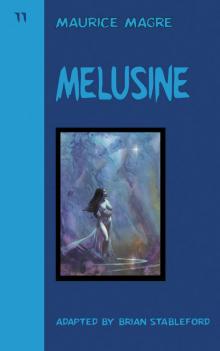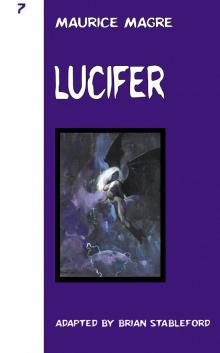- Home
- Maurice Magre
The Angel of Lust Page 2
The Angel of Lust Read online
Page 2
The reasons for that change of direction were undoubtedly connected with changes to Magre’s attitude to “the angel of lust” occasioned by the diagnosis of his syphilis, but the inevitable corollary to his change of attitude to the lusts of his inferior self was a corresponding change of attitude to the spiritual quest of his higher self. La Luxure de Grenade bids an equivocal farewell to the angel of lust, as personified by Isabelle de Solis, and the protagonists in Magre’s subsequent works all prove more resistant to the wiles of her deceptive successors, albeit rather reluctantly in some cases. All of those subsequent works offer their protagonists a more fruitful relationship to true wisdom, as conceived and gradually transformed by Magre, than the one that poor Almazan eventually contrives to attain, and their exploits mirrored a more determined effort to draw constructive lessons therefrom, in spite of the difficulty of so doing. In its fashion, however, La Luxure de Grenade laid important groundwork for those works, as well as completing a strange trilogy of exotic erotic fantasies begun by Priscilla d’Alexandrie.
Like the tales of disenchantment collected in Histoire merveilleuse de Claire d’Amour suivie d’autres contes merveilleux, La Luxure de Grenade is a marginally nihilistic work, reflecting in gaudy fashion the désespoir that Magre eventually characterized as the ground-state of his soul in the opening paragraph of La Beauté invisible. That despair is, however, countered within the text by Christian Rosenkreutz, who is never in any danger of the kind of capitulation to the treacherous beacon light of amour suffered in the earlier story by the cynic philosopher Bigorneau. As well as a conclusion to one phase of Magre’s literary productivity, therefore, La Luxure de Grenade represented the beginning of another, in which the possibility of intellectual progress was not denied, even though its difficulty, in opposition to everything for which Tomas de Torquemada stood, was fully recognized.
The translation of La Vie amoureuse de Messaline was made from a copy of the 1925 Flammarion edition. The translation of La Luxure de Grenade was made from a copy of the 1926 Albin Michel edition. The translation of “Christian Rosenkreutz et les Rose-croix” was made from the London Library’s copy of the 1930 Fasquelle edition of Magiciens et illuminés.
Brian Stableford
THE LOVE LIFE OF MESSALINA
I. Messalina’s Face
How can the facial features and corporeal form of Messalina be recovered? What painter could render us that mask of ever-unsated pleasure, the superstition that did not fear justice, but only the thousand divinities prowling in the air and under the ground? Who could resuscitate the long and delicate body, the breasts that, we are told, were high and firm, the inexhaustible loins, and that surge of the entire being toward the physical enjoyment of life?
Her effaced image, which one can seek to divine in cameos of the time, we imagine between two dragons—doubtless lust and death—extraordinarily childlike, rounded, bright and feminine, but with a basic angularity of the face, a solid jaw, not bestial but the jaw of a terrestrial creature, made for eating, biting and shouting. One is also struck by the astonishing luxuriance of the hair. It is a forest that has scarcely left room for the face, which consumes the forehead, and which from the root of the ears, springs forth, overwhelms and undulates, attesting to the fertility of the blood, an unaccustomed richness of nature.
Her quest for rare perfumes, the care she put into composing them herself, the quality of the baths she took, her love of mirrors—of which she had a collection of all forms—attest to an extreme refinement, and the fact that she worshiped her body. The liking for having numerous men as lovers, who were sometimes vulgar, is consistent with the preciosity of her form, and might even be the consequence of it.
As if the animality that she possessed intimately had wanted to mask by its seal the translucent skin imbued with aromas, she bore on the interior part of the right thigh a little tuft of hair that the pomades of all the physicians of the Roman Empire could not succeed in removing.
She was a delicate being whom sensuality held by its chain.
There is no synthesis more perfect than a woman’s face. A country, a race and a time are fixed in mobile features, eyes that change and a mouth that creases. But the divine synthesis is partly effaced, nothing remains to us but a reflection. We cannot read in the intensely green eyes, it seems, the secret that all beings hide, which we do not learn sufficiently from the actions of Messalina’s life. Did she carry within her the admirable anxiety of true lovers, or did she only pursue the satisfaction of her senses? If she gave herself to so many men, was it because she was seeking one man, the double that one has lost without ever having possessed, the one that ought to render the peace of the heart, fill in the ocean of desire and aid you to realize yourself? Or did she only expect a new form of pleasure from each of them? Did she have elevated goals beyond those that can be reached by the quest of lust? Did she attain the superior secret that certain souls sometimes obtain from the excesses of the flesh?
She was not the monstrous being that legend has created. Her name has remained for us a symbol of evil passions because we are accustomed to consider extreme sensuality, unjustly, as a quality in a man and as a vice in a woman. But the ancients had a conception of amour very different from ours, and if chastity was respected, so was immodesty, and it even had a religious character in certain cases.
Several of Messalina’s lovers were poisoned on her orders, others were condemned to open their veins. But it is necessary to remember that, in all times and in all peoples, supreme power has engendered in sovereigns the desire to cause the death of those who are inconvenient to them, especially those they have loved. In any case, everything is relative, and after that of Tiberius and that of Caligula, the reign of Claudius and Messalina appeared to the Romans to be full of justice.
Who will render us the gaze of Messalina, in which there must have been cruelty, the hope of pleasure, scorn for those who were ignorant of its refinements, and perhaps the kind of ingenuous gleam that women have who often fall back into the puerility of enjoyment? Green and black, assuredly, mortal to those that were lost there, pitiless to those who turned away from it, the color of death and of joy, but with perhaps, far away, the light that there is in the eyes of every creature amorous via the senses, the light of the flesh that nevertheless transmits a little of the spirit.
II. The Temple of Priapus
It is beyond the transtiberian region, beyond the quarter of vagabonds, acrobats and animal-exhibitors, that the Temple of Miphileseth1 is found. To reach it, it is necessary to pass not far from Hadrian’s Mausoleum, to emerge from Rome’s enclosing wall through the Aurelian Gate, follow the narrow paved road bordered here and there by a few tombs and wretched buildings and turn right on to a stony pathway. That path climbs a woody hill between cypresses, goes past a pond, and ends at the very door of the temple.
No one hid any longer in order to go there, although it was publicly notorious that on certain nights the obscene rites of the god Priapus were celebrated there under his Asiastic personification. The times of the consul Posthumius2 had revolved and the virtuous measures taken two centuries earlier against the initiates of the Bachanalia were no longer in vigor.
The temple was rather compact and circular in form. It was built in white stone and had a singularly low door that was not precisely in the middle of two columns of disproportionate height. Externally, the statues were disposed of six priapic genii, servants of Aphrodite: Tychon, Conisatus, Orthanes, Lordon, Cydbasus and Pyrges. In the cella of the temple was the god himself, a little to the left, as if a deliberate asymmetry had been the rule to which the ancient architect had conformed.
The god, on a granite pedestal, was carved in the wood of a fig-tree, painted red. He was covered with a goatskin, and necklaces of vine-branches were passed round his neck. He carried a staff in his right hand as a reminder that he had originally served as a scarecrow in the gardens to drive away birds and thieves. The naïve sculptor, who had wanted to give the face a cheerfu
l expression, had only succeed in putting a sad bestiality therein, and, such as he was—the head sunken, almost devoid of a neck, with his enormous phallus, his deformed legs scarcely sketched outside the wood of the tree—he appeared the very symbol of generative matter, of physical amour in its primitive form.
In the posterior vestibule of the temple there was a stairway that led to a basement of sorts. That basement, greater in dimension than the temple, had once served to shelter the mysteries of the Bacchanalia in the time of the persecutions. It now served the priest as a storeroom for offerings, which were numerous.
The priest was a Jew named Chilon. He had repaired the abandoned temple. He had kept the god, but he had given him the name he bore in Palestine, Miphileseth, in order to attract the faithful, for foreign gods were supposed to have more power than the Roman gods. He said that he was the sole representative of the cult founded by Maacha, mother of Asa, King of Judea.3 In reality, the mysteries of Miphileseth were nothing but a reproduction of the ancient Roman Bacchanalia, but Chilon had created the belief by clever propaganda that he held secrets of pleasure from the Orient and that he could render women fecund or sterile at will. He had grouped around him a small community of men and women who, under the color of religiosity, came to the temple on certain nights to satisfy their sensuality. That community included people of all classes—rich and poor, gladiators and pederasts, even senators and matrons, and among the latter was the beautiful Lepida, the wife of the noble Messalla Barbatus, cousin of Claudius.4
It was the hour when the boatmen of the Tiber were beginning to light their lanterns among the willows of the river. The setting sun inflamed the monuments. On the field of Mars buccinas resounded, preceding a passage of cataphracts. The sound of chariots, the cries of litter-bearers pronouncing the name of their master in order to cut through the crowd more rapidly, the groans of the sick awaiting their cure under the columns of the temple of Aesculapius, the appeals of tennis-players and discus-throwers, spheromaques, throwers of the arenaire and the triagonal, were all confounded into a single powerful rumor that was about to die down with the descent of dusk.
A flame caused the enormous crystal ball posed like a diadem on the tomb of Agrippa to sparkle. On Caelius Mons, the muses of Thespis and the marble Venus in front of the temple of Felicity were tinted red. The temple of Volupia seemed to enveloped with a more profound silence the mysterious goddess Angerona, who was honored there and whose worship had for its object the silence of the true name of Rome, which ought not to be pronounced.5
A light floated for a few seconds over the map of the world that Augustus had had engraved on the portico at Pola, to trail thereafter over the Porta Ratumena at the extremity of the Capitoline hill. The colossal statue of Apollo, and those of Jupiter Proedator, Jupiter the Thunderer, Marsyas and Romulus were animated by a luminous life that was communicated to the thousands of statues scattered over all the crossroads and squares and in front of all the temples. Then the shadow seemed to rotate around the umbilicus of Rome and the ruminal fig-trees. The enormous veil of dust that rose from the city like an exhalation, started to fall back slowly.
It was then that, in a stola of somber hue, with a veil hiding her facial features, Lepida emerged from her house of porphyry at the base of the Palatine hill, not far from the Circus Maximus, followed by her daughter Messalina, then aged thirteen, whom she was about to enable to live the first day of her life—for, according to the secret rite of the little temple of which Lepida was a priestess, life only commenced for a woman at the moment when she lost her virginity.
A single slave accompanied them, the one who was to bear the torch without which the return journey through the dark streets of Rome would have been very difficult.
They passed over the Tiber at the Palatine bridge and hastened past the tomb of Numa, because that was a meeting-place for prostitutes and thieves. Sometimes, a passer-by called out to Lepida, mistaking her for a woman seeking to prostitute her daughter. Her rapid stride and the forbidding face of the slave following her corrected the misapprehension immediately.
By the time the stars began to shine, they had passed though the Caesarian woods, left the fortress of the Janiculum behind and were climbing the little path between the cypresses to the temple of Miphileseth.
The priest Chilon was waiting for them on the threshold. He appreciated the full value of the living offering that was about to be brought to him, but he knew everything that he was giving in exchange by means of his intervention with the god. The one whose virginity had devolved to him would know nothing of amour but pleasure. A faculty of enjoyment would be born in her that ought no longer to run dry. She could, by the force of her will, obtain fecundity or sterility, and if it pleased her to be fecund, to have a male or female child, as she wished. She would not know the resistance of a lover. A magical force would incline toward her anyone she might desire.
Near the genii of the threshold, men and women were seated who were chatting and laughing together. Almost all of them knew one another, being regulars, but they had not seen one another for several months, for it was April, and those festivals had not taken place during the winter. They were pouring one another large cups of satyrion, a beverage with aphrodisiac virtues prepared by Chilon.
The cella of the temple was only just large enough to contain the whole crowd, but everyone had to come to touch the statue of the divinity with a hand in order to be penetrated by his force. A dense human warmth soon reigned. It was necessary for several people to go out in order to allow in the donkey, the goat and the rabbit that were to be sacrificed. Two dancing girls began to spin without pause around the statue, accompanied by an Egyptian cithern and singing a kind of amorous lament.
Chilon sacrificed the animals and poured a part of their blood into an immense bronze cup, after which their remains were dragged outside; but an insipid odor had spread. The movement of the dancers became increasingly rapid, and their shriller lament seemed calculated to shred the nerves of the spectators.
Then Chilon took the bronze vase between his knees and made a sign. Lepida handed him a solid gold needle, which she brought every time and left as a present. The members of the audience approached one by one, lifting up their tunic and holding out their bare arm. Chilon pricked each arm slightly and mingled their blood in the vase with that of the donkey, the goat and the rabbit.
One drop sufficed, for in the slightest parcel of blood there are countless magical beings that multiply in being separated from a man, whose power is amplified in being mixed with another blood. Those magical beings are then possessed of a strange life. They act in a singular fashion on the man to whom they belong, actively directing him according to their own law, and because they mingle in the bottom of the bronze vase with the magical beings of other men, they impel their former possessors to come together and fuse. And the blood of the animals, in addition to the pantheistic symbolism, is there to communicate genetic force and bestial instinct.
When everyone had accomplished the rite, Chilon stirred the contents of the bronze vase with a rod made from a mandrake root, and began to pass it from hand to hand. Some with a sensual avidity, others with a pious gratitude, all of them without disgust, drank a mouthful of the red liquid. There were some who wanted to drink again, and from whom it was almost necessary to snatch the vase by force. There were some did not wipe their lips and remained in ecstasy, their eyes raised to the heavens, their limbs seized by tremors.
A few were gripped by sacred fury even before having drunk. They fell to the ground and writhed there, prey to spasms, or went out precipitately and started twirling round a cypress, imitating the chant of the two cithern players.
Night had fallen completely and only three oil-lamps, combined with the serene light of the spring stars, illuminated the temple. Then Chilon launched a ball of colored metal against a gong suspended from a column. Dominating speech and stifled cries, the result of that was a plangent sound with unexpected vibrations, which seemed t
o penetrate the members of the audience. The laughter became hysterical, veils and tunics were ripped from top to bottom; hair was suddenly loosened, traversed by hands, emitting supernatural sparks. The crowd abruptly poured outside. Lepida felt a strong, familiar hand in the nape of her neck, drawing her away. The exhausted dancers had fallen to the ground, and the noise of their panting breath was audible.
Chilon had kept Messalina beside him. She had remained calm and staring beneath her white veils. He grabbed her arm sharply, but he did not have to drag her. She marched beside him with a firm tread, without suffering from the priest’s ugliness, his vile smile and his eyes, so small that no gaze could be encountered there. He took her into the posterior vestibule of the temple and, illuminating it with a lamp that exhaled a nauseating odor of burnt oil, he took her down the few steps to the basement, in order to complete the rite.
The slave who accompanied Lepida and her daughter had attached a sand-glass to his belt. He had lain down on the ground at the place where the sandy path between the cypresses met the road, When the sand had run out he had the mission of lighting a torch and waving it. Thus, doubtless because of the excuses she had furnished to her husband, Lepida was obliged to measure her pleasures. Anxious, but respectful nevertheless of the majesty of the sexual god, she had waited for her daughter crouched before the genius Pyrges.
In the same way that it is irresistible, physical lust is essentially brief. At present, bewildered couples were motionless under the pines. Several were seen who were stretched out on the ground, asleep. There were men wandering, head bowed, as if searching for some lost object.

 Melusine
Melusine Lucifer
Lucifer Jean de Fodoas
Jean de Fodoas Priscilla of Alexandria
Priscilla of Alexandria The Blood of Toulouse
The Blood of Toulouse The Angel of Lust
The Angel of Lust